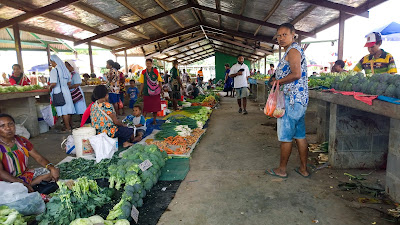How do you eat? Meaning, go to grocery store, grow or gather?
Great question! The people of Papua New Guinea are mostly hunters/gatherers, so their diet mainly consists of garden vegetables, fruits, and the occasional meat that they get from wild pig, large bats, the cassowary bird, or other small mammals. Some also raise their own pigs or chickens for meat. People who live closer to town have access to stores, so they can get rice and canned tuna or mackerel.
We, however, eat more of a Western diet. There are grocery stores in the main towns that carry a fairly decent selection of common Western foods, like pasta noodles, flour, sugar, canned goods, frozen meat, eggs, and dairy products. Although it can be a bit frustrating because you often have to go to several different stores to find the exact ingredients that you need.
 |
| A fairly modern grocery store |
 |
| Lots of home-grown food |
Right now, since we're living on the mission base, we have easy access to town and stores. When we move out to the tribe, it will be a bit harder to get our supplies. There will be a missionary on the base whose sole job is buying groceries for the missionaries in tribal locations. So we'll send an email to him with our list of needed supplies. He'll go to town, buy what he can, package it all up in boxes, and send it out to us on the next available airplane flight. We're so thankful for this guy's hard work to help us out!
 |
| A bulk foods store in town |
 |
| We can even get toiletries in country |
 |
| We helped buy and package supplies for missionaries for a few months while we were there |
Fun fact: the word for "eat" in the trade language is "kaikai". And it's also the word for "food". So it can be both a verb and a noun depending on context!

